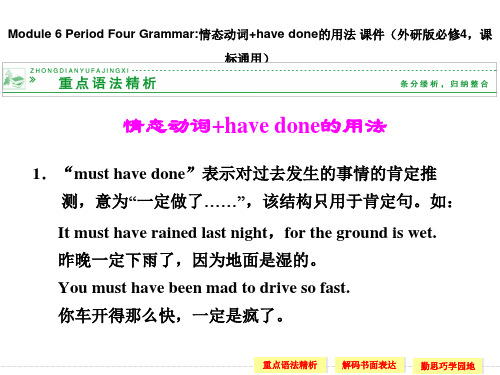Module 6 Period Four Grammar
Grammar—Review:word formation

1.句1和句2中的蓝色单词都是由两个词合在一起构成的一个新词,这种词叫_合_ 成词 ,这种构词法被称为合成法。 2.句3,6,7中的蓝色单词是在词根之前加上前缀 ,或在词根之后加上 后缀 ,构 成一个与原来单词意思相近或相反的单词,这种构词法叫派生法。 3.句8中的两个post词性不同:第一个post为 动词 ,意为“发帖子”;第二个 post为 名词 ,意为“ 帖子”。这是在不改变词形的前提下将一个词由一种词 性转化为另外一种词性,这种方法被称为 转化法 。 4.句4,5中的WHO,IT,US是截取单词的首字母组合而成的单词,这种方法 叫 之前加前缀或在词根之后加后缀构成一个与原来单词意
义相近或相反的单词。除少数前缀外,前缀一般改变单词的意思,不改变词
Unit 2
Exploring English
内容索引
Period Four Grammar—Review:word formation
语 法 导 学 感悟规律 重点难点剖析
语法感知
感知以下课文原句,完成方框下的小题
1.This made me realize that there’s no egg in eggplant either. 2.Neither is there pine nor apple in pineapple. 3.If harmless actions are the opposite of harmful actions,why are shameless and shameful behaviors the same? 4.When you see the capitalized “WHO” in a medical report,do you read it as the “who” in “Who’s that?” 5.What about “IT” and “US”?
七年级英语上Unit6FoodandlifestylePeriod4Grammar习题新牛津11

D. carton of orange
【点拨】考查名词的可数性。carton是可数名词, 而 orange意为“橙汁”时是不可数名词; How many后 接可数名词复数形式, 故选B。
一、用括号内所给词的适当形式填空
1. The new plan asks residents (居民) to put their rubbish into
5. The teachers and students in our class are all ___C_h_i_n_e_s_e__ (China).
6. Three __J_a_p_a_n_e_s_e__ (Japan) and two Americans will come to our school next week.
13. There is some milk in the glass. (改为否定句) There ___is_n_'_t__ ___a_n_y___ milk in the glass.
14. There are over twenty students in the classroom. (对画线部分提问) ___H_o_w___ __m__a_n_y__ students ___a_r_e___ __t_h_e_r_e__ in the classroom?
15. I'd like two kilos of meat. (对画线部分提问) ___H__o_w__ __m__u_c_h__ __m__e_a_t__ would you like?
三、单项选择 16. Jane is very thirsty, so she needs some ____A____. 【中考·毕节】 A. water B. bread C. cakes D. rice
Module 6 Period Four Grammar情态动词+have done的用法 课件(外研版必修4,课标通用)

done的形式。
答案 D
重点语法精析
解码书面表达
勤思巧学园地
2.(1)can/could have done表示对过去的推理,用于否定句, 疑问句中,表示对发生行为的惊疑、怀疑或不肯定, could语气较委婉,“本来可以”“可能已经”。如用在否定 句中,否定意义最强烈,通常有迹象表明根本不可能。 Where can they have gone?他们能去哪儿呢?(表惊疑) They could have gone to the cinema. 他们可能去电影院了。(表不肯定) I met him at school yesterday afternoon,so he couldn't have attended your lecture. 昨天下午我在学校遇上他了,因此他不可能参加你的讲 座。(有迹象表明,强烈地否定)
重点语法精析
解码书面表达
勤思巧学园地
【单项填空】
—Have you seen my key? I remember I put it here yesterday.
—Don't worry.You________it in the wrong place.
A.must put
B.should have put
D.ought to have come
解析 本题考查情态动词。句意:昨天的聚会非常成功,
很有趣。你本来应该来的,为什么没有来?句子说的是对
已经发生的事情的推测,应用“情态动词+have done”结
构,故排除A项;B项表示“准是已经做某事”;C项表示“可
能已经做某事”;D项表示“本来应该做某事”,由句意知D
重点语法精析
解码书面表达
Module6Grammar

非限制性定语从句只是对主句内容,或 先行词的补充、解释或附加说明。主句 与先行词或从句之间一般用逗号分开, 常常单独翻译。没有它,主句意思仍然 完整。引导非限制性定语从句的关系代 词有as,which,who, whom,whose 等,作定语从句的主语、宾语、定语。 关系副词有when,where等,作定语从 句的状语。关系代词和关系副词在定语 从句中一般不能省。
5. 主从之间存在逻辑上的因果关系时, 关系词往往用which。 Tom was late for school again and again, which made his teacher very angry.
【例1】 Carol said the work would be done by October, ____ personally I doubt very much. A. it B. that C. when D. which “我个人所怀疑的”是“到十月份这工作 能否被完成”,而不是“十月份”,由 此判定非限制性定语从句所修饰的不是 October,而是前面整个主句。答案:D 。
非限制性定语从句 1. which引导的非限定性定语从句来说明 前面整个句子的情况或主句的某一部分 (先行词),that不能用于引导非限制性 定语从句。 That house, which was built a hundred years ago, stood still in the earthquake. 那座房子在地震中依然耸立,它是一百 多年前建造的。 2. 有时as也可用作关系代词。
【例3】 Alice received an invitation from her boss, ___ came as a surprise. A. it B. that C. which D. he 此为非限定性从句,不能用 that修饰, 而用which。it 和he 都使后句成为句子, 两个独立的句子不能单以逗号连接。况 且选he句意不通。答案C。
外研版8年级单词表

外研版8年级单词表Module 1.1. translate [trænzˈleɪt] v. 翻译。
2. translation [trænsˈleɪʃn] n. 翻译;译文。
3. correct [kəˈrekt] v. 改正;纠正 adj. 正确的,对的。
4. match [mætʃ] v. 将……配对。
5. number [ˈnʌmbə(r)] n. 数字;号码。
6. repeating [rɪˈpiːtɪŋ] n. 重复;复述。
7. grammar [ˈɡræmə(r)] n. 语法。
8. pronunciation [prəˌnʌnsiˈeɪʃn] n. 语音;发音。
9. writing [ˈraɪtɪŋ] n. 写作;文章。
10. punctuation [ˌpʌŋktʃuˈeɪʃn] n. 标点符号。
11. spelling [ˈspelɪŋ] n. 拼写。
Module 2.1. hill [hɪl] n. 小山;小丘。
2. population [ˌpɒpjuˈleɪʃn] n. 人口;全体居民。
3. wide [waɪd] adj. 宽的;宽阔的。
4. million [ˈmɪljən] num. 百万。
5. pretty [ˈprɪti] adv. 相当地;非常;很 adj. 漂亮的。
6. than [ðæn, ðən] prep. 比。
7. get [ɡet] v. 变成;成为;到达。
8. north [nɔːθ] n. 北;北方 adj. 在北方的;朝北的。
9. south [saʊθ] n. 南;南方 adj. 在南方的;朝南的。
10. west [west] n. 西;西方 adj. 在西方的;朝西的。
11. home town [ˈhəʊm taʊn] 故乡;家乡。
12. especially [ɪˈspeʃəli] adv. 尤其。
2020外研版高一英语必修三教案:Module 6 全单元

Module 6 Old and New 一、教学内容、目的和要求(from the teacher’s book )Period 1Introduction + Listening + PronunciationPart 1. IntroductionTask: Practice oral expression by learning man-made projects.Teaching procedures:1. 1) Discuss the four questions in pairs.2) Ask the students to read out their answers.2. 1) Read through the words in the box and ask the students to look up the words they don’t know.2) Play a game. The teacher says some explanations of the words and let the students say this word out.3. 1) Before reading the passage, ask: How much do you know about the Great Wall of China /Hongkong International Airport /The Three Gorges Dam?2) Let the students read through the passage and write down the key words.3) Work in groups to introduce the one of the three man-made projects4) Find the answers to the three questions on the student’s book.4. Explain some new words, phrases.Part 2. ListeningTask:Train the students to make notes while listening and pay attention to the language phenomena to make preparations for Function and Everyday English.Teaching procedures:1. 1) Ask the students to read the subjects2) Listen to the tape and tick the subjects that they hear3) Check the answers with them2. 1) Read through the questions.2) Listen to the tape again and answer the questions.3) Check their answers.3. 1) Have the students do the activity individually, then check with a partner. 2) Listen to the tape once more to check their answers.Part 3. PronunciationTask:Practise the intonation of the students with non-defining attributive clauses.Teaching procedures:1. Read the sentences and underline the attributive clauses.2. Check their answers.3. Play the type for a couple of times.4. Let the students follow the tape to read.5. Pair them to practice.Homework: Write about a famous man-made project..Period 2 Reading and VocabularyTask: Learn about the Three Gorges Dam.Teaching procedures:1. Revision Ask the students to introduce another man-made project2. 1) Deal with the new words and phrases in the text by reading for them.2) Make sure the students know about their meanings.3. Ask the students to do “T” or “F” questions and check the answers.4. 1) Have the students read the questions and then read the text.2) Ask the students to answer the questions one by one and correct them.5.1) Ask the students to read the passage again.2) Write questions for the answers.6. Give the students some other questions to answer.7. 1) Read the text again and write down the key words.2) Try to say something about the Three Gorges Dam without referring to the book.8.1) Work in groups to discuss the questions on the student’s book.2) Call back their ideas.Home work: Retell the passage about the Three Gorges Dam.Period 3 Language points of Reading +Task +speaking Part 1. Language points of ReadingTeaching procedures:1. Revision Let students retell the text.2. Key words, phrases1) dream vt. +n./prep./that clauseeg. He dreamt that he was flying around the earth .I dreamt a sweet dream last night.dream of 梦见,向往,渴望eg. Tom often dreams of having his own car.2) hold back阻止,阻碍eg. Nothing can hold back the wheel of history.……忍住,抑制eg. Hearing the exciting news. She couldn’t hold back her tears.隐瞒,保留eg. He held something back from me.3) provide something for sb./sb. with sth. 为某人提供某物eg. Our school provided books for us.= Our school provided us with books.4) 建议suggest sth./sth. to sb. /doing sth. /that-clauseeg. The teacher suggested a rest to us.He suggested starting at once.The doctor suggested the patient ( should ) be operated on immediately.表明,暗示。
外研版精品英语选择性必修三Unit6 Grammar—Review:

Natureபைடு நூலகம்in words
内容索引
Period Four Grammar—Review:non-finite forms as attributive, adverbial and complement
语 法 导 学 感悟规律 重点难点剖析
感知以下句子,补全方框下的小题
语法感知
1. ...I saw the ground so fantastically carpeted. 2. ...wake up to find yourself in another quite different,... 3. ...I can see the children flattening their noses against the window,... 4. ...flattened my nose against the cold window to watch the falling snow... 5. st year I was out of the country,sweating in a hot climate,... 6.Carson urged people to make themselves aware of the facts and do something about the situation.
1.以上句子中,句1,句3和句6为非谓语动词形式作 宾补 ,过去分词形式表 示被动 或完成;现在分词形式表示 主动 或进行;不定式形式表 将来 。 2.句2,句4中的不定式形式和句5中的现在分词形式在句中作状语;句2中的 不定式形式作 结果 状语,句4中的不定式作目的 状语,句5中的现在分词作 _伴__随___状语。 3.句4中的现在分词形式作 定语 ;单个的现在分词一般放在名词前面,现在 分词短语放在名词的 后面 。
高中英语 Module4 Grammar课件 外研版选修6

2.表示一直到说话时为止的一段时间内一再 重复的动作。
例句:
(1)I have been meeting her at the library. 我多次在图书馆遇见到她。
(2) I have been telling you to be careful for weeks. 这几个星期我一直在告诉你要小心。
Example sentences:
True or False
Liu Fang has played the pipa since the
age of six.
She’s given concerts since she was eleven.
Now, please tick the following sentences you agree with according to the above example sentences. 1: Liu Fang still plays the pipa. 2: She only played the pipa when she was six. 3: She has given concerts regularly since the age of eleven. 4: She only gave concerts when she was a child.
Module Four Music
Teaching aims and demands:
1. To experience and discover what is the Present Perfect Progressive Tense. 2. To grasp the usage of the Present Perfect
- 1、下载文档前请自行甄别文档内容的完整性,平台不提供额外的编辑、内容补充、找答案等附加服务。
- 2、"仅部分预览"的文档,不可在线预览部分如存在完整性等问题,可反馈申请退款(可完整预览的文档不适用该条件!)。
- 3、如文档侵犯您的权益,请联系客服反馈,我们会尽快为您处理(人工客服工作时间:9:00-18:30)。
—What has happened to George?乔治发生了什么事?
—I don't know.He may have got lost. 我不知道。他可能迷路了。
She might have achieved greater progress,if you had
given her more chances. 如果你多给她点机会,她或许能取得更大的进步。
答案
D
重点语法精析 解码书面表达 勤思巧学园地
5.needn't have done表示过去做了其实不必做的事,表示 埋怨或后悔等,意为“本可不必”“满可以不”。
I actually needn't have bought so much wine—only three
people came.其实我本没必要买这么多酒,只来了三个 人。
重点语法精析 解码书面表达 勤思巧学园地
【写作要求】 1.内容完整充实,语言连贯通顺; 2.词数:不少于100。 【写作分析】 第一步,认真审题 本文按要求写一篇欢迎辞,属于应用文体裁。在正式的 场合迎接客人时,主人要讲一些热情友好的话向客人表示欢
迎,使客人感到宾至如归,这就是欢迎辞。
1.英文欢迎词需包括称呼、正文和结束语。最常用的 称呼是“Ladies and gentlemen”,也可根据听众的不同,使用 “Dear friends”及“Fellow students”等。正文是文章的主体。 结束语可以用“Thank you”一句带过。
形式;can't have done是对过去的否定推测,“本来不可能 ”;mayn't have done表示“过去或许没有做某事”;needn't have done表示“过去没有必要做某事但却做了”。由句意知 D项正确。
答案
D
重点语法精析 解码书面表达 勤思巧学园地
应用文之欢迎辞
【写作任务】 写一篇迎接英国交换生的欢迎辞。 【写作内容】 假设你是某外语学校学生会主席周晓,你校为迎接英 国交换生将举办一场欢迎会。请你根据以下要点提示,准 备一篇英文欢迎辞。 要点提示: 1.对英国交换生表示欢迎; 2.介绍你校; 3.说明交换生项目的意义。
座。(有迹象表明,强烈地否定)
重点语法精析 解码书面表达 勤思巧学园地
(2)could have done还可用来表示过去可能完成而实际未实现
的动作或与过去事实相反也就是事实上并没有发生过。 You could have phoned me.I didn't know where you were.我 不知道你在哪儿,你本来可以打电话给我。 I couldn't have lived through Christmas without giving you a
重点语法精析 解码书面表达 勤思巧学园地
2.具体到本次写作,可根据要点提示,分两部分展 开。首先,作为发言者,要代表学校向交换生表示欢迎。
接下来,向英国交换生介绍学校概况、阐述交换生项目的
意义,也可预祝交换生在你校学习、生活顺利,只要添加 的内容与话题相符就行。 3.语言应准确、贴切,有条理,同时应体现出致辞者 的热情。 第二步:提炼要点 1.welcome party 2.introduce our school 3.a foreign language school 4.exchange programme 5.understand Chinese culture
重点语法精析
解码书面表达
勤思巧学园地
【单项填空】 —Have you seen my key? I remember I put it here yesterday. —Don't worry.You________it in the wrong place. A.must put B.should have put
Module 6 Period Four Grammar:情态动词+have done的用法 课件(外研版必修4,课
标通用)
情态动词+have done的用法
1.“must have done”表示对过去发生的事情的肯定推 测,意为“一定做了……”,该结构只用于肯定句。如: It must have rained last night,for the ground is wet. 昨晚一定下雨了,因为地面是湿的。 You must have been mad to drive so fast.
重点语法精析 解码书面表达 勤思巧学园地
第三步:扩点成句 1.Welcome to our welcome party.
2.I am delighted to introduce our school to you on
behalf of all my fellow students. 3.Our school is a foreign language school and has a
重点语法精析
解码书面表达
勤思巧学园地
【单项填空】 As you worked late yesterday,you________have come this morning.
A.mayn't
C.mustn't 解析
B.can't
D.needn't
本题考查情态动词。句意:由于你昨晚工作很晚,
今天早上你本来不需要来的。mustn't have done是一种错误
重点语法精析 解码书面表达 勤思巧学园地
【参考范文】 Hello everyone, Welcome to our school and welcome to our welcome party! My name is Zhou Xiao.As president of the Students' Union,I am delighted to introduce our school to you on behalf of all my fellow students.Our school is a foreign language school and has a long history.Besides this,our school is famous for the exchange programme which includes various courses ranging from Chinese to maths.The Chinese Language and Literature is a toprated course provided especially for exchange students.I believe all of you can benefit from this exchange programme greatly in terms of understanding Chinese culture.I hope you will enjoy your time at our school.Thanks for listening.
本题考查情态动词。句意:感谢你上周的辛苦工
作。我想要不是你的辛勤劳动,我们不可能做成。句中
without you表达的是“如果没有你的辛苦工作的话”,结合 句子前后内容,本题表达是与过去相反的虚拟语气,故选B
项。
答案 B
重点语法精析 解码书面表达 勤思巧学园地
3.“may have done”与“might have done”常用于表示对过 去发生的事情的可能性推测,意为“可能已经,也许已经 ”,多用于肯定句。might have done的可能性比may have done的还要小。如:
him.看,汤姆哭了。我不应该对他如此严厉的。
I ought to have gone home last Sunday. 我本应上星期天回家的。
重点语法精析
解码书面表达
勤思巧学园地
【单项填空】 The party held yesterday was a great success,so interesting.You________,but why didn't you?
could语气较委婉,“本来可以”“可能已经”。如用在否定
句中,否定意义最强烈,通常有迹象表明根本不可能。 Where can they have gone?他们能去哪儿呢?(表惊疑)
They could have gone to the cinema.
他们可能去电影院了。(表不肯定) I met him at school yesterday afternoon,so he couldn't have attended your lecture. 昨天下午我在学校遇上他了,因此他不可能参加你的讲
long history.
4.Our school is famous for the exchange programme which includes various courses ranging from Chinese to maths. 5.I believe all of you can benefit from this exchange programme greatly in terms of understanding Chinese culture.
你车开得那么快,一定是疯了。
重点语法精析 解码书面表达 勤思巧学园地
【单项填空】 —It is said that the man lived alone on the lonely island for about 3 months before he was saved. —Really? He________a lot of difficulties! A.may go through B.might go through C.ought to have gone through D.must have gone through 解析 本题考查情态动词。由句意“据说那人在获救前孤身
